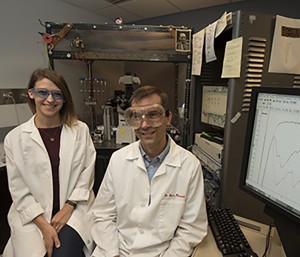
Shedding light on possible contributors to autism, schizophrenia and other neuro-psychiatric disorders, researchers have found that a type of support cell abundant in the brain may play a role in the ability of neurons to communicate.
The team of scientists, at Washington University School of Medicine in St. Louis found, in culture, that without these cells — called astrocytes — the ability of neurons to send certain signals is slowed. Such a slowdown could interfere with neuronal development and contribute to conditions linked to communication between neurons, including autism and schizophrenia.
The study is available in The Journal of Neuroscience.
“This work highlights that although neurons are the focus of considerable research, the brain is composed of other types of cells that also are very important,” said first author Courtney Sobieski. “Astrocytes are support cells that appear to play a key role in the development of healthy neurons. The neurons have trouble communicating without the support of astrocytes.”
Senior author Steven Mennerick, PhD, professor of psychiatry, explained that glutamate, a neurotransmitter, plays a key role in carrying messages around the brain.
“It’s the main transmitter at about 90 percent of the points of communication in the brain,” he said. “And we found that when we take away astrocytes, glutamate signaling is compromised.”
Sobieski, a graduate student in Mennerick’s lab, developed a way to grow individual neurons either with or without astrocytes. As they compared the neurons in culture, they found found that when there was no astrocyte, a neuron’s ability to send glutamate signals slowed down and became disjointed.
“The delay was several milliseconds,” explained Mennerick, also an investigator with the Taylor Family Institute for Innovative Psychiatric Research. “That may sound like a small amount of time, but in electrical communication in the central nervous system, a few milliseconds is a very big deal. Such a delay could interfere with neuronal development and contribute to problems seen in conditions such as autism and schizophrenia.”
The disruptions in glutamate signaling linked to astrocytes also may be related to seizure disorders, such as epilepsy, that are characterized by interrupted electrical signaling.
Mennerick said more research is needed but that it is important for researchers to look beyond neurons.
“It may be that the root of a problem is related to a nearby astrocyte,” he said. “So broadening our perspective and keeping those connections in mind when there are disruptions in signaling between neurons is an important implication of this work.”
Funding for this research comes from the National Institute of Mental Health, the National Institute of General Medical Sciences and the National Institute of Neurological Disorders and Stroke of the National Institutes of Health (NIH), and from the Taylor Family Institute for Innovative Psychiatric Research. NIH grant numbers R21 MH099658, R01 MH101874, T32 GM08151, F31 NS066611 and R01 MH078823.
Sobieski C, Jiang X, Crawford DC, Mennerick S. Loss of local astrocyte support disrupts action potential propagation and glutamate release synchrony from unmyelinated hippocampal axon terminals in vitro. The Journal of Neuroscience, published online Aug. 5, 2015. DOI:10,1523/JNEUROSCI.1289-15.2015